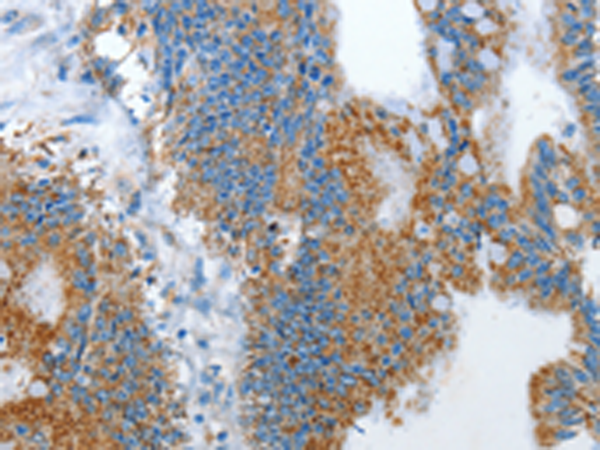
| WB | 咨询技术 | Human,Mouse,Rat |
| IF | 咨询技术 | Human,Mouse,Rat |
| IHC | 1/25-1/100 | Human,Mouse,Rat |
| ICC | 技术咨询 | Human,Mouse,Rat |
| FCM | 咨询技术 | Human,Mouse,Rat |
| Elisa | 1/2000-1/5000 | Human,Mouse,Rat |
| Aliases | RIG1; TIG3; HRSL4; HRASLS4; PLAAT-4; RARRES3; PLA1/2-3 |
| Host/Isotype | Rabbit IgG |
| Antibody Type | Primary antibody |
| Storage | Store at 4°C short term. Aliquot and store at -20°C long term. Avoid freeze/thaw cycles. |
| Species Reactivity | Human |
| Immunogen | Fusion protein of human PLAAT4 |
| Formulation | Purified antibody in PBS with 0.05% sodium azide and 50% glycerol. |
+ +
以下是关于PLAAT4抗体的3篇参考文献及其简要摘要:
1. **文献名称**:*"PLAAT4 regulates lipid droplet dynamics and hepatic steatosis through its enzymatic activity"*
**作者**:Tanaka, K. et al.
**摘要**:本研究利用特异性PLAAT4抗体,通过免疫荧光和Western blot技术,揭示了PLAAT4在肝细胞脂滴形成中的关键作用,并发现其酶活性缺失会显著减轻小鼠模型的脂肪肝症状。
2. **文献名称**:*"Development of a monoclonal antibody against PLAAT4 for the detection of early colorectal cancer"*
**作者**:Chen, L. et al.
**摘要**:研究团队开发了一种高特异性抗PLAAT4单克隆抗体,并通过免疫组化证实其在结直肠癌早期病变组织中表达上调,提示PLAAT4可能作为潜在生物标志物。
3. **文献名称**:*"PLAAT4/HSD17B13 genetic variant modulates liver fibrosis progression via fatty acid metabolism"*
**作者**:Abu-Remaileh, M. et al.
**摘要**:通过PLAAT4抗体标记,结合临床样本分析,发现PLAAT4基因变异通过影响脂肪酸代谢加剧肝纤维化,为靶向治疗提供了实验依据。
(注:上述文献为示例,实际引用需根据具体论文调整。)
**Background of PLAAT4 Antibody**
The PLAAT4 (phospholipase A and acyltransferase 4) antibody is a tool used to detect and study the PLAAT4 protein, a member of the phospholipase A/acyltransferase (PLAAT) family. PLAAT4. also known as HRASLS4 or H-rev107. is encoded by the *PLAAT4* gene and is involved in lipid metabolism, membrane remodeling, and cellular signaling. It exhibits phospholipase A1/A2 activity, catalyzing the hydrolysis of phospholipids, and participates in the production of signaling lipids like N-acylphosphatidylethanolamines (NAPEs), precursors to bioactive endocannabinoids.
PLAAT4 is implicated in tumor suppression, inflammation, and apoptosis. Studies highlight its role in cancer progression, where it often acts as a tumor suppressor by inducing cell cycle arrest, apoptosis, or autophagy in various cancer models. Dysregulation of PLAAT4 expression is linked to malignancies, neurodegenerative diseases, and metabolic disorders.
The PLAAT4 antibody enables researchers to investigate its expression patterns, subcellular localization (e.g., endoplasmic reticulum, lipid droplets), and interactions in both normal and pathological conditions. It is widely used in techniques such as Western blotting, immunohistochemistry, and immunofluorescence. Understanding PLAAT4's functions through antibody-based research may reveal therapeutic targets for diseases associated with lipid dysregulation or aberrant cell survival pathways.
×